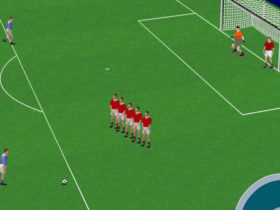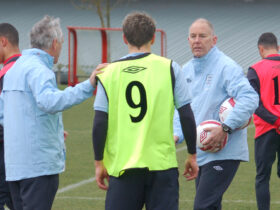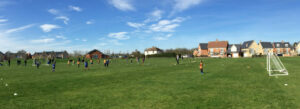Swiss Hans Kamper wanted to play football in his new home town… 112 years on, and his dream has become one of the biggest clubs in world football
The name of Swiss Hans-Max Kamper may not be familiar with everyone, but to Catalans he’s as important as Messi, Cruyff, Kubala, Alcántara. In fact, if it wasn’t for Kamper, even the club itself may never have been. One of the world’s greatest clubs and reigning Spanish champions were founded by the 22-year-old who had recently arrived from Basle.
A keen sportsman, Kamper was a sporting pioneer having already played a part in the early days of Swiss club FC Basle, and worn the captain’s armband to boot. He set sail for Africa in 1899 with the intention of setting up a sugar trading company, but on route spent time playing rugby in France before stopping in Catalonia, where his uncle, Emili Gaissert, lived. He fell in love with Barcelona and as dreams of sugar soon dissolved he settled into Catalan life. But something was clearly missing.
While working as an accountant for a local Tram company and as a columnist for newspaper Desportes, Kamper would spend his spare time surrounded by sport enthusiasts and paid regular visits to the local Gimnasio Sole. But while many of its regular attendees showed little interest in football, a game looked down upon by many of the city’s bourgeoisie as being one for the poor, Kamper was undeterred.
Back then the Swiss had to settle for pen and paper. Even in this age of communication with Twitter and Facebook, surely his eight-line appeal could have been no more powerful. On 22 October 1899, within the pages of Desportes, appeared his message that would become one of the most important in the story of football.
“Our friend and companion, Hans Kamper,” it read, “Former Swiss (football) champion, being keen on organising some football games in the city, asks anyone who feels enthusiastic enough about the sport to present themselves at the offices of this newspaper any Tuesday or Friday evening between the hours of 9 and 11pm.”
The response was swift, and the very next evening Kamper was joined by a group including Swiss, English, Catalans, who had obviously not the same prejudices against football as many of the Barcelona’s wealthy residents. It was clear to Kamper and his new friends that there was a keen interest in the game within Catalonia, so a month later, at the Gimnasio Sole, the group met for what became the foundation of a new football club. While Kamper was the instigator he was interested mainly on playing still, so a vote was called and Walter Wild became the first president of Foot-ball Club Barcelona.
“Gamper had won medals as an athlete and as a cyclist in Switzerland, but when he came here he was only really interested in football,” says Frederick Witty, one of the players. “He had the idea, and then inspired us with his enthusiasm,” adds Arthur Witty. “His powers of persuasion were very great. That’s why we all followed him.”
Barca were soon playing matches and wearing their famous blaugrana strip. Kamper was also credited for that by some, too, with the colours borrowed from his old club in Basle. However, there are people who dispute this with the Merchant Taylor’s School in Merseyside credited by some as the inspiration.
Nine years later, the club’s driving force eventually stepped into the President’s shoes with FC Barcelona on the verge of folding. But not before he’d helped them lift their first trophy, the Copa Mayaca in 1901, and reach the Copa Del Rey final in 1902, though they lost 2-1 to Club Vizcaya. During his first four years playing for Barca, Kamper had featured 48 times and scored over 100 goals – a tally that would make even Lionel Messi gulp.
“He had an extraordinary control and dribbled better than anybody,” continues Arthur Witty. “He scored more goals that anybody else. He’d run a lot, lifting his knees up; he gave an image of huge potential that I’ve seen in very few players.”
When he took the reigns of the club in 1908, the first of five periods as Club President, the loss of a number of key players had meant a dip in results and they went three years without winning a title.
By this time Kamper regarded himself as a Catalan. He spoke the dialect fluently and had adopted the Catalan variation of his name, Joan Gamper. Within a year at the helm, Gamper had raised enough money to fund a move into the club’s first permanent home, Carrer Indústria, a stadium with a capacity of around 6,000.
Gamper urged more people to join the club and by the time he oversaw a move to the club’s next home, Les Corts, in 1922 they boasted 22,000 members. They stayed at Les Corts until 1957 when they finally took up residence at the Camp Nou.
Barca legend Paulino Alcántara, the club’s all time top-scorer, was recruited by Gamper, too, and in 1917 he appointed Jack Greenwell as their first full-time manager. During the Gamper-era FC Barcelona won eleven Championat de Catalunya, six Copa del Rey and four Coupe de Pyrenées, while they enjoyed their first golden age. As well as Alcántara, the Barça team under Greenwall also included players like Ricardo Zamora, Josep Samitier, Félix Sesúmaga and Franz Platko. Under his gudiance, Barca won 12 Catalan Championships, five Spanish championships and the membership grew to 12,000.
But his reign in Spain ended in drama, and eventually led to his death aged 52. In June 1925, fans at Les Corts booed the Spanish national anthem before applauding God Save The Queen, which was being performed by a visiting British Royal marine Band. Accused of promoting Catalan nationalism, the stadium’s doors were shut for six months, but Spain’s to Gamper were closed forever as he was expelled from the country.
He returned to Switzerland where, sadly, personal problems prompted a period of depression and in July 1930 Gamper took his own life.
36 years after his passing, Gamper’s memory still lived strong at FC Barcelona, and then-President Enric Llaudet created the Joan Gamper Trophy. Though he was gone, an annual pre-season tournament in his honour ensured he would never be forgotten.
He left behind a legacy for the city and the region – an institution – something that the members of Barcelona would always regard as More Than A Club.
Originally published in the England v Switzerland matchday programme on 4 June 2011





































